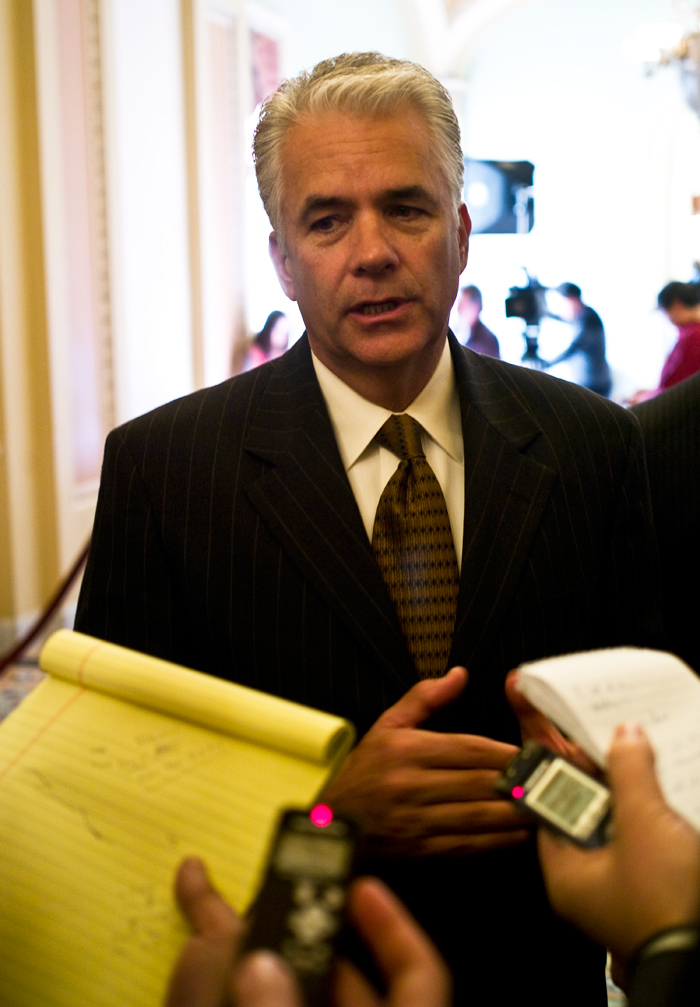The Senate Ethics Committee has uncovered extensive evidence that former Sen. John Ensign (R-NV) and others broke U.S. law by trying to cover up an affair Ensign had with a campaign aide, the wife of one of his top Senate staffers.
The panel has forwarded the evidence of criminal activities to the Department of Justice for further investigation, which it is required to do in any investigation that turns up evidence of criminal wrongdoing, Sens. Barbara Boxer (D-CA), who chairs the ethics panel, and Johnny Isakson (R-GA), said in letters to the DOJ and FEC released Thursday along with a final report from a special prosecutor handling the case.
“The committee voted unanimously to refer Senate findings to the Department of Justice and the Federal Election Commission because we have reason to believe that Sen. Ensign violated laws within their jurisdiction,” Boxer said in a rare floor speech addressing the committee’s usually private proceedings.
The evidence the committee uncovered is so egregious, Boxer said, that a special counsel assigned to the case was set to recommend expulsion had Ensign not resigned. The potential criminal actions include aiding and abetting the violation of the one-year post-employment lobbying ban, discrimination on the basis of gender, false statements to the FEC and obstruction of justice, among others.
Noting that Ensign was still holding fast to the claim he had not broken the law when he he announced his resignation, Boxer said she wanted to “go on record as chairman of the Ethics Committee to say how strongly I disagree with that statement.”
“The committee believes that that every senator should read this report very carefully because it is a cautionary tale, because it says our actions have consequences for our families, for our staff…,” she said Thursday on the Senate floor. “We must ensure that every action that we take is above the law. And it my personal view it shows something else. When you are in a position of trust and power, don’t abuse it, don’t misuse it because people can get hurt–very, very hurt.”
“It’s a sad chapter for the Senate but a sadder chapter for the lives it destroyed,” she added.
Boxer and Isakson said the committee thoroughly examined the case against Ensign, deposing more than 72 witnesses and scrutinizing more than half a million pages of documents.
The committee “did not act on what it thought, on an opinion or a whim,” Isakson said.
Justice Department spokesman Laura Sweeney acknowledged receiving the letter but declined further comment.
The conclusion of the case is two years in the making. In 2009 Ensign admitted to having an affair with a former campaign aide, Cynthia Hampton, and then helping her husband, also a top aide, establish a brief lobbying career. As the ethics panel was wrapping up its case in late April, Ensign announced his retirement, effective May 3, the day before his sworn deposition was to begin, according to the ethics committee’s final report.
The probe focused on the great lengths — and potentially illegal steps — Ensign took to keep the affair quiet, including having his parents (wealthy Las Vegas casino owners) pay the Hamptons $96,000 in hush money.
The report found ample evidence that Ensign knowingly helping Doug Hampton violate the one-year lobbying ban by helping him set up a short-lived job on K Street.
In fact, Ensign tried to conceal his affair and actions to keep in under wraps in so many ways the committee said he was guilty of creating a “web of deceit that entangled and compromised numerous people.”
“…Although concealment is part of the anatomy of an affair, the concealment
conduct in this case by Senator Ensign exceeded the normal acts of discretion and created a web of deceit that entangled and compromised numerous people, including a loyal chief of staff, was an abuse of the Senator’s power, and raised serious issues of violations within the Committee’s jurisdiction,”
In March federal prosecutors charged Doug Hampton with seven counts of violating conflict-of-interest laws. In December Ensign said the Justice Department had told him he was no longer a target in its probe, but shortly after the Ethics Committee’s hiring of a special counsel to continue its investigation, Ensign said he would retire instead of seeking reelection.
The Federal Election Commission said the $96,000 payments did not violate campaign-finance law because they were paid in installments to the Hamptons and their children in amounts allowed under U.S. tax law.
Still insisting he did nothing wrong in announcing his resignation in April, Ensign said he decided it was time to go after the Ethics Committee named a special prosecutor to continue looking into the matter, even though he believed the Justice Department had dropped its case and the FEC has dismissed the accusations against him.
The ethics investigation was initiated after Citizens for Ethics and Responsibility in Washington filed a complaint. Melanie Sloan, CREW’s executive director, called the ethics panel’s decision to forward the information to DOJ “encouraging.”
“The ball is now back in DOJ’s court, but its recent track record for taking on politicians has been abysmal,” Sloan said. “It is puzzling how DOJ, armed with the full might of the legal system was unwilling or unable to reach the same conclusions as the ethics committee. Perhaps this report will give DOJ the spine it so clearly lacks, and the courage to finally take on Senator Ensign.”
“Public Report_Preliminary Inquiry Into the Matter of Sen Ensign
Additional reporting by Ryan J. Reilly.









